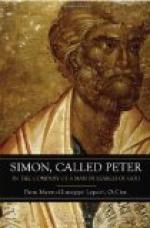Graham jumped up. “Good Heavens, Pennell!” he exclaimed, “I’m blest if I hadn’t.” He pushed his arm out and glanced at his watch. “Oh, there’s plenty of time, anyway. I’m lunching with this blighter down town, padre, at some special restaurant of his,” he explained, “and I take it the sum and substance of his unseemly remarks are that he thinks we ought to get a move on.”
“Don’t let me stand in the way of your youthful pleasures,” said Arnold, smiling; “but take care of yourself, Graham. Eat and drink, for to-morrow you die; but don’t eat and drink too much in case you live to the day after.”
“I’ll remember,” said Peter, “but I hope it won’t be necessary. However, you never know ‘among the multitude,’ do you?” he added.
Arnold caught up the light chair and lunged out at him. “Ye unseemly creature,” he shouted, “get out of it and leave me in peace.”
Pennell and Peter left the camp and crossed the swing bridge into the maze of docks. Threading their way along as men who knew it thoroughly they came at length to the main roadway, with its small, rather smelly shops, its narrow side-streets almost like Edinburgh closes, and its succession of sheds and offices between which one glimpsed the water. Just here, the war had made a difference. There was less pleasure traffic up Seine and along Channel, though the Southampton packet ran as regularly as if no submarine had ever been built. Peter liked Pennell. He was an observant creature of considerable decencies, and a good companion. He professed some religion, and although it was neither profound nor apparently particularly vital, it helped to link the two men. As they went on, the shops grew a little better, but no restaurant was visible that offered much expectation.
“Where in the world are you taking me?” demanded Peter. “I don’t mind slums in the way of business, but I prefer not to go to lunch in them.”
“Wait and see, my boy,” returned his companion, “and don’t protest till it’s called for. Even then wait a bit longer, and your sorrow shall be turned into joy—and that’s Scripture. Great Scott! see what comes of fraternising with padres! Now.”
So saying he dived in to the right down a dark passage, into which the amazed Peter followed him. He had already opened a door at the end of it by the time Peter got there, and was halfway up a flight of wood stairs that curved up in front of them out of what was, obviously, a kitchen. A huge man turned his head as Peter came in, and surveyed him silently, his hands dexterously shaking a frying-pan over a fire as he did so.
“Bon jour, monsieur,” said Peter politely.
Monsieur grunted, but not unpleasantly, and Peter gripped the banister and commenced to ascend. Half-way up he was nearly sent flying down again. A rosy-cheeked girl, short and dark, with sparkling eyes, had thrust herself down between him and the rail from a little landing above, and was shouting:




